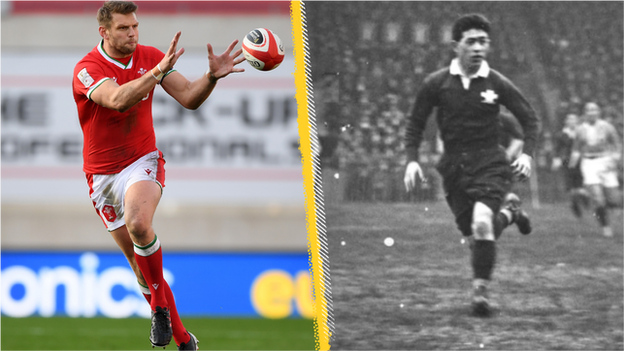Bobby Jones: Recalling the Wales and Northampton fly-half with Japan links
- Published

Dan Biggar and Bobby Jones both played for Wales and Northampton but a century apart
When Dan Biggar runs out to face Japan for the British and Irish Lions at Murrayfield he will be carrying on a tradition of Wales and Northampton fly-halves that go back a century.
For Biggar in 2021 read Bobby Jones in 1920s, Northampton's first Wales international, a fly-half like his modern-day successor.
Diminutive in stature, Jones was said to be very quick from a standing start, spotting gaps in defences and darting through for Wales and the East Midlands side in the 1920s.
You couldn't get a more Welsh surname than Jones but his background is far more cosmopolitan than that name suggests.
Two countries, England and Wales battled over his services - and for a third, Japan, Jones is an important figure in their rugby history but almost entirely forgotten.
His father was a diplomat, a Welshman who worked in the British Embassy who met his wife when he was based in Tokyo.
After they were married, Jones senior was transferred to the British embassy in Shanghai, where Bobby was born in 1900 and would spend much of his childhood.
He attended Thomas Hanbury School in Shanghai from the age of nine but in 1916 he left home and was sent to board at Bedford School.
Jones spent three successful years at the school, winning his colours for rugby and swimming and passing the London University Matriculation exams to attend the City and Guilds Engineering Institute in London.
Rugby was playing an increasingly important part in Jones' life. While studying engineering he joined Richmond, playing regularly for them at fly-half with his older brother Harry on the wing. A job with Northampton Borough took him back to the midlands and to Franklin's Gardens, where he made his debut for Northampton Saints in 1922.
Jones was an immediate success at Saints. In his first season he top-scored with 13 tries, showing "exceptional skill".
By 1924 there were growing rumbles in Northampton newspapers Jones should be considered for England, coming to national prominence after the East Midlands met New Zealand in December 1924 at the County Ground in Northampton.
Despite a 31-7 defeat, "Japanese" Jones as the newspapers sometimes called him, excelled. He scored a try out wide to give the East Midlands an early lead before dropping a goal from 30 yards in the second half.
A year later and international honours came to Jones but not before a tug-of-war over his services, although Japan was not an option for him.
It was England who came calling first, with Jones being selected for the Possibles against the Probables at Bath in December 1925.
Jones had a great game, switching sides halfway through, which made his omission from the final trial at Twickenham a week later all the more baffling. Outrage in Northampton ensued.
Wales wasted no time in seizing their opportunity with Jones immediately picked to play for the Probables in their trial match in Cardiff and then for Wales to face England in January 1926.
There were howls of protest on both sides of the Severn Bridge. Not for the first time the question of eligibility was raised and debated in the papers.
Jones himself had little to say, telling the Western Mail, "My father's a Welshman, my English qualification is by my having learned the game in England and by my playing for English teams.
Whether or not such qualification should be annulled or amended is a matter for the Unions."
There was no mention of the fact that China was the country of his birth or that his mother was Japanese.
Jones made his international debut in Cardiff in a controversial 3-3 draw. Three weeks later Wales lost to Scotland at Inverleith.
He went into that game having scored five tries for Northampton against Batley and although he told reporters he felt he had had a good game against Scotland, he was left out for the next game against Ireland.
One more cap was to follow for Jones - against France in Paris in April.
He almost missed the match due to a high temperature. Perhaps he wished he had - Wales won a rather dull game 7-5 with Jones impressing few critics.
He may not have graced the international stage again, but his Saints career continued with great success. Having been vice-captain in the 1925-26 season, Jones was given the captaincy the following year.
He continued playing for another five seasons, making 231 appearances for Saints, scoring 74 tries and dropping 12 goals. And he also continued to play for the East Midlands.
After rugby, Jones continued to work as an engineer all his life, for among others Parnall Aircraft and Avery Scales.
He married Lilian Atterbury in 1921 and had two children - Robert and Myrtle. His granddaughter Gina remembers him as a well-to-do, lovely man.
Bobby Jones died in 1970 and should not be forgotten for his achievements in the East Midlands, for Wales and perhaps also in Japan.
He may not have seen himself as a pioneer, but that's surely how this diminutive, smiling fly-half should be remembered.